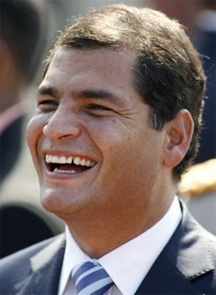QUITO, (Reuters) – Ecuador demanded yesterday that the U.S. ambassador leave the country, declaring the envoy “persona non grata” over U.S. diplomatic cables released by WikiLeaks reporting alleged police corruption.

Foreign Minister Ricardo Patino said he had not received a satisfactory explanation from the envoy, Heather Hodges, about the cables that were signed by her office.
“Ecuador’s government has decided to consider this woman as a persona non grata … we have asked her to leave the country in the shortest time possible,” he told a news conference.
Patino said the decision did not mean Ecuador was breaking off ties with the United States, and that he hoped relations would not be affected by the measure against Hodges.
The U.S. government said the expulsion was “unjustified.”
“The Department will examine its options to respond to this Ecuadorean action,” State Department spokesman Charles Luoma-Overstreet said in an emailed comment.
Ecuador’s President Rafael Correa said the “intrusion” by the U.S. embassy into his country’s internal affairs had been “very serious,” and that he expected Washington to take some form of diplomatic reprisals for Hodges’ expulsion.
“The United States will come with retaliations, because that is the arrogant imperialist policy,” he told reporters. “We will respond at a regional level. I am sure that UNASUR will give Ecuador its total support in this deplorable case.”
UNASUR, or the Union of South American Nations, is a recently formed 12-nation hemispheric grouping modeled on the European Union that combines the Mercosur and Andean Community of Nations customs unions.
The Ecuadorean embassy in Washington said the measure was aimed at Hodges and not at the U.S. government.
“It is unfortunate that the published documents on WikiLeaks have made it impossible to continue collaborating with the current ambassador to Quito, but we hope to work with a new ambassador,” the embassy said in a statement.
